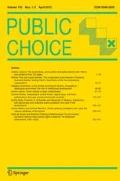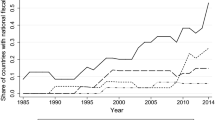Abstract
This paper investigates the impact of elections on the level and composition of fiscal instruments using a sample of 19 high-income OECD democracies during the period 1972–1999. We find that elections shift public spending towards current expenditures at the cost of public investment. Although we find no evidence for an electoral cycle for government deficit and overall expenditures, we find a negative effect of elections on revenue attributed to a fall in direct taxation. Our results apply for predetermined electoral periods while endogenous elections seem to increase deficit and leave the composition of fiscal policy unaffected.
Similar content being viewed by others
References
Akhmedov, A., & Zhuravskaya, E. (2004). Opportunistic political cycles: test in a young democracy setting. The Quarterly Journal of Economics, 119(4), 1301–1338.
Alesina, A., Cohen, G. D., & Roubini, N. (1993). Electoral business cycle in industrial democracies. European Journal of Political Economy, 9(1), 1–23.
Alesina, A., & Roubini, N. (1992). Political cycles in OECD economies. Review of Economic Studies, 59(4), 663–688.
Alesina, A., Roubini, N., & Cohen, G. D. (1997). Political cycles and the macroeconomy. Cambridge: MIT Press.
Alesina, A., & Tabellini, G. (1990). A positive theory of fiscal deficits and government debt. Review of Economic Studies, 57(3), 403–414.
Alt, J. E., & Chrystal, K. A. (1983). Political economics. Berkeley: University of California Press.
Alt, J. E., & Lassen, D. (2006). Fiscal transparency, political parties, and debt in OECD countries. European Economic Review, 50(6), 1403–1439.
Angelopoulos, K., & Economides, G. (2008). Fiscal policy, rent seeking and growth under electoral uncertainty theory and evidence from the OECD. Canadian Journal of Economics, 41(4), 1375–1405.
Angelopoulos, K., Economides, G., & Kammas, P. (2007). Tax-spending policies and economic growth: theoretical predictions and evidence from the OECD. European Journal of Political Economy, 23(4), 885–902.
Arellano, M., & Bond, S. (1991). Some tests of specification for panel data: Monte Carlo evidence and an application to employment equations. Review of Economic Studies, 58(2), 277–297.
Arellano, M., & Bover, O. (1995). Another look at the instrumental variable estimation of error-components models. Journal of Econometrics, 68(1), 29–51.
Armingeon, K., Gerber, M., Leimgruber, P., & Beyeler, M. (2008). The comparative political data set 1960–2006. Berne: Institute of Political Science, University of Berne.
Ashworth, J., & Heyndels, B. (2002). Tax structure turbulence in OECD countries. Public Choice, 111(3–4), 347–376.
Belke, A., Baumgärtner, F., Schneider, F., & Setzer, R. (2007). The different extent of privatization proceeds in OECD countries: a preliminary explanation using a public-choice approach. FinanzArchiv: Public Finance Analysis, 63(2), 211–243.
Besley, T., & Case, A. (1995). Does electoral accountability affect economic policy choices? Quarterly Journal of Economics, 110(3), 769–798.
Blais, A., & Nadeau, R. (1992). The electoral budget cycle. Public Choice, 74(3), 389–403.
Block, S. (2002). Elections, electoral competitiveness, and political budget cycles in developing countries. Harvard University CID Working Paper No. 78.
Blundell, R., & Bond, S. (1998). Initial conditions and moment restrictions in dynamic panel data models. Journal of Econometrics, 87(1), 115–143.
Bräuninger, T. (2005). A partisan model of government expenditures. Public Choice, 125(3), 409–429.
Breitung, J., & Pesaran, M. H. (2008). Unit roots and cointegration in panels. In L. Matyas & P. Sevestre (Eds.), The econometrics of panel data (pp. 279–322). Berlin: Springer.
Brender, A., & Drazen, A. (2005). Political budget cycles in new versus established democracies. Journal of Monetary Economics, 52(7), 1271–1295.
Brender, A., & Drazen, A. (2008). How do budget deficits and economic growth affect reelection prospects? Evidence from a large panel of countries. American Economic Review, 98(5), 2203–2220.
Brender, A., & Drazen, A. (2009). Do leaders affect government spending priorities? NBER Working Papers No. 15368.
Cukierman, A., & Meltzer, A. H. (1986). A positive theory of discretionary policy, the cost of democratic government, and the benefits of a constitution. Economic Inquiry, 24(3), 367–388.
Cusack, T. (1997). Partisan politics and public finance: changes in public spending in the industrialized democracies, 1955–1989. Public Choice, 91(3–4), 375–395.
Drazen, A. (2000). The political business cycle after 25 years. NBER Macroeconomic Annual, 15, 75–117.
Drazen, A., & Eslava, M. (2010). Electoral manipulation via voter-friendly spending: theory and evidence. Journal of Development Economics, 92(1), 39–52.
Franzese, R. J. (2000). Electoral and partisan manipulation of public debt in developed democracies, 1956–1990. In R. Strauch & Jürgen von Hagen (Eds.), Institutions, politics and fiscal policy (pp. 61–83). Dordrecht: Kluwer Academic.
Franzese, R. J. (2002). Electoral and partisan cycles in economic policies and outcomes. Annual Review of Political Science, 5, 369–421.
Gemmell, N., Kneller, R., & Sanz, I. (2007). Tax composition and economic growth in OECD countries. Mimeo.
Gonzalez, M. (2002). Do changes in democracy affect the political budget cycle? Evidence from Mexico. Review of Development Economics, 6(2), 204–224.
Greene, W. H. (2003). Econometric analysis. Englewood Cliffs: Prentice-Hall.
Hadi, A. S. (1992). Identifying multiple outliers in multivariate data. Journal of the Royal Statistical Society, Series B 54(3), 761–771.
Hallerberg, M., & Basinger, S. (1998). Internationalization and changes in tax policy in OECD countries: the importance of domestic veto players. Comparative Political Studies, 31(3), 321–353.
Heckelman, J. C., & Berument, H. (1998). Political business cycles and endogenous elections. Southern Economic Journal, 64(4), 987–1000.
Hibbs, D. A. (1977). Political parties and macroeconomic policy. American Political Science Review, 71(4), 467–487.
Im, S., Pesaran, H., & Shin, Y. (2003). Testing for unit roots in heterogeneous panels. Journal of Econometrics, 115(1), 53–74.
Kittel, B., & Winner, H. (2005). How reliable is pooled analysis in political economy? The globalization-welfare state nexus revisited. European Journal of Political Research, 44(2), 269–293.
Kiviet, J. F. (1995). On bias, inconsistency, and efficiency of various estimators in dynamic panel data models. Journal of Econometrics, 68(1), 53–78.
Kneebone, R., & McKenzie, K. (2001). Electoral and partisan cycles in fiscal policy: an examination of Canadian provinces. International Tax and Public Finance, 8(5), 753–774.
Kneller, R., Bleaney, M., & Gemmell, N. (1999). Fiscal policy and growth: evidence from OECD countries. Journal of Public Economics, 74(2), 171–190.
Levitt, S. D. (1997). Using electoral cycles in police hiring to estimate the effect of police on crime. American Economic Review, 87(3), 270–290.
Lindbeck, A. (1976). Stabilization policy in open economies with endogenous politicians. American Economic Review, 66(2), 1–19.
Maddala, G. S., & Wu, S. (1999). A comparative study of unit root tests with panel data and a new simple test. Oxford Bulletin of Economics and Statistics, 61(0), 631–652.
Malley, J., Philippopoulos, A., & Woitek, U. (2007). Electoral uncertainty, fiscal policy and macroeconomic fluctuations. Journal of Economic Dynamics and Control, 31(3), 1051–1080.
McCallum, B. T. (1978). The political business cycle: an empirical test. Southern Economic Journal, 44(3), 504–515.
Milesi-Ferretti, G. M., Perotti, R., & Massimo, R. (2002). Electoral systems and public spending. The Quarterly Journal of Economics, 117(2), 609–657.
Mink, M., & de Haan, J. (2006). Are there political budget cycles in the euro area? European Union Politics, 7(2), 191–211.
Mueller, D. C. (2003). Public choice III. Cambridge: Cambridge University Press.
Nickell, S. J. (1981). Biases in dynamic models with fixed effects. Econometrica, 49(6), 1417–1426.
Nordhaus, W. D. (1975). The political business cycle. Review of Economic Studies, 42(2), 169–190.
Paldam, M. (1989). Politics matters after all: testing Hibbs’ theory of partisan cycles. Aarhus University, Mimeo.
Peltzman, S. (1992). Voters as fiscal conservatives. The Quarterly Journal of Economics, 107(2), 327–361.
Persson, T., & Tabellini, G. (1990). Macroeconomic policy, credibility and politics. London: Harwood.
Persson, T., & Tabellini, G. (2002). Political economics: explaining economic policy. Cambridge: MIT Press.
Persson, T., & Tabellini, G. (2003). The economic effect of constitutions. Cambridge: MIT Press.
Potrafke, N. (2006). Political effects on the allocation of public expenditures: empirical evidence from OECD countries. DIW Discussion Papers No. 653.
Potrafke, N. (2011, forthcoming). Public expenditures on education and cultural affairs in the German states: does government ideology affect the budget composition? German Economic Review.
Reid, B. G. (1998). Endogenous elections, electoral budget cycles and Canadian provincial governments. Public Choice, 97(1–2), 35–48.
Rodrik, D. (1998). Why do more open economies have bigger governments? Journal of Political Economy, 106(5), 997–1032.
Rogoff, K. (1990). Equilibrium political budget cycles. American Economic Review, 80(1), 21–36.
Rogoff, K., & Sibert, A. (1988). Elections and macroeconomic policy cycles. Review of Economic Studies, 55(1), 1–16.
Roodman, D. (2009a). How to do xtabond2: an introduction to ‘difference’ and ‘system’ GMM in Stata. Stata Journal, 9(1), 86–136.
Roodman, D. (2009b). A note on the theme of too many instruments. Oxford Bulletin of Economics and Statistics, 71(1), 135–158.
Rosenberg, J. (1992). Rationality and the political business cycle: the case of local government. Public choice, 73(1), 71–81.
Saporiti, A., & Streb, J. (2008). Separation of powers and political budget cycles. Public Choice, 137(1), 329–345.
Schneider, C. J. (2010). Fighting with one hand tied behind the back: political budget cycles in the West German states. Public choice, 142(1), 125–150.
Schuknecht, L. (1996). Political business cycles and fiscal policies in developing countries. Kyklos, 49(2), 155–170.
Schuknecht, L. (2000). Fiscal policy cycles and public expenditure in developing countries. Public Choice, 102(1–2), 115–130.
Shi, M., & Svensson, J. (2006). Political budget cycles: do they differ across countries and why? Journal of Public Economics, 90(8–9), 1367–1389.
Tufte, E. (1978). Political control of the economy. Princeton: Princeton University Press.
Veiga, L., & Veiga, F. (2007). Political business cycles at the municipal level. Public Choice, 131(1), 45–64.
Vergne, C. (2009). Democracy, elections and allocation of public expenditures in developing countries. European Journal of Political Economy, 25(1), 63–77.
Author information
Authors and Affiliations
Corresponding author
Rights and permissions
About this article
Cite this article
Katsimi, M., Sarantides, V. Do elections affect the composition of fiscal policy in developed, established democracies?. Public Choice 151, 325–362 (2012). https://doi.org/10.1007/s11127-010-9749-8
Received:
Accepted:
Published:
Issue Date:
DOI: https://doi.org/10.1007/s11127-010-9749-8




